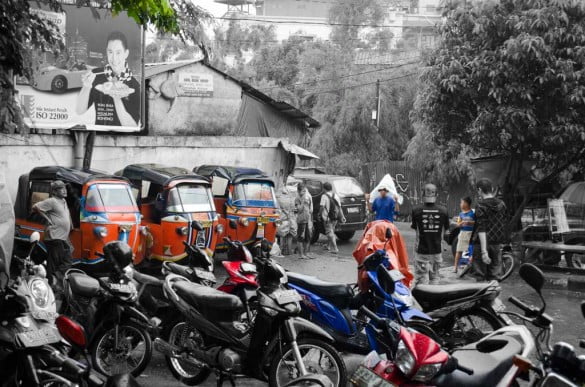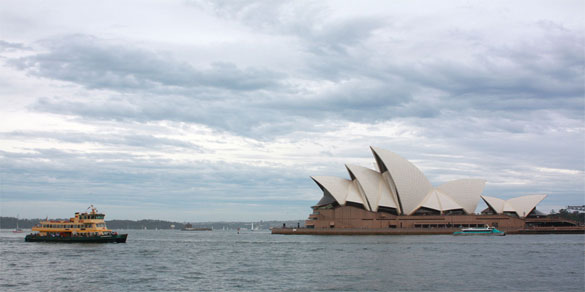My wife Srie and I, normally resident in Indonesia, recently spent four months in Sydney where our son is studying.
I’m British, and this was my fifth visit to Sydney and my seventh to Australia. My first reaction this time was “This is a nation of FOODIES!”. What a contrast to my first visit in 1989, when the dominating food smell was lamb chops, closely followed by fish’n’chips. Now Sydney must be the most culinary-obsessed city in the world, with a vast selection of restaurants and cafes, overflowing onto the pavements Mediterranean style, and day and night packed with patrons obviously enjoying not slaving away in 9 to 5 offices – I mean they can’t all be visitors. “Master Chef” and its companions dominate the TV screens. Well, I guess there’s nothing wrong with nutritious well-cooked food, and the Australians are definitely veering in the direction of the French/Sundanese “live to eat” attitude rather than the Brit/Javanese one of “eat to live”. However, with the strength of the Australian dollar, food prices for us were high compared to Jakarta. An average food court/restaurant meal with drink costs about A$15-20 (approx rp 150,000 to 200,000). The cheapest deal I found was A$5 pie and chips on the UNSW campus.
The next obvious difference is the refreshing attitude in Australia of minding one’s own business. In general, nobody bothers with or comments on what you look like, what you wear, etc. People get on with their individual lives. In contrast, it seems that hovering over Indonesia a huge gossip-fuelled incubus continually probing for and feeding on perceived negative behaviour. Is this the sign of a stupid level of intelligence, or a more noble concern with social cohesion?
It all comes down to whichever is stronger: individualism as in Western countries: social feeling as in Indonesia and other Asian countries. Both have their place in the world. The upside in Indonesia is that the sensitivity of feeling in Indonesia, manifested in the friendliness and hospitality of its inhabitants, does lubricate the land, and make it a far more pleasant place to live than some more individualistic and aridly efficient countries. I found myself crying with happiness as I returned to this land which has become my second home.
This reaction would be incomprehensible to the Sydneysider we met while flat-hunting there. When I told him that we lived in Indonesia, he countered with one word, “Why?” Not “Where?” but “Why? Both countries have a misleading impression of each other. Indonesia is generally seen in Australia as teeming with poverty and corruption, a base for terrorists and gangs of people smugglers.
This was illustrated by the recent case of the “Bali Boy”, the 14-year old Australian who was caught in Bali with cannabis, in fact boasting of it while the locals were telling him not to flaunt it. Cries of horror permeated the Australian press, and the Prime Minister herself was involved in a campaign to rescue the poor boy from what would appear to be a fate reserved for victims of the Gestapo or the Inquisition. Whatever one’s opinion about the criminality of using weed, the fact is that, as Bobby Fuller once said, he fought the law and the law won. I never saw this once mentioned in the Australian press. And while I’m on this, what about the Australian slobs who regularly turn Kuta into a toilet, especially past midnight when the bars secrete them into the streets. One such paragon was heard to say “I get drunk on the plane going there, I’m drunk all the time in Bali, and I’m still drunk on the plane going home.” There are three words for this kind of behaviour – stupid racial arrogance. What would happen if a bunch of Indonesians or other Asians behaved like that on the Gold Coast? – they’d be cut to pieces.
This group, it must be said, is in stark contrast to the thousands of fine, sensitive Australian backpackers and holidaymakers who interact positively with Bali and Indonesia.
However, the Bali slob stereotype does reinforce an attitude in some circles Indonesia that Australians are crude and racialist. This is becoming rarer, although most Asian students I talk to say that they still experience racialism in Australia. Most countries in the world, however, could learn from the affirmative social programs, government and volunteer, that are in place in Australia. Medical and community welfare programs are at the leading edge. And on a more individual level, there is a quiet compassion and mutual respect among Australians, no matter what their racial origin. We were fortunate to find a flat in Coogee Bay, near the ocean and the whales and dolphins, and for some reason lots of Kiwis. It turned into a village for us over the four months we were there, and we got to know many of the people by sight and name – if it were Wales it would be Len the Bus, Kane the Hair, Kurt the Travel, Gerry the Heritage, Wayne and Nicole the Fish’n’Chips, etc. Yes, for me, the Sydneysiders, with their geniality, wry humour, compassion and underlying toughness, are among the finest people in the world.
And Australia, increasingly multicultural, has surely the potential to become one of the world’s really leading nations. Its values of true blue, mateship, and seeing the other bloke’s point of view, are a fine inheritance. It has traditional democracy and firm communal institutions in place, and can open itself up to a far greater population.
Indonesia, on the other hand, has the problems in reverse. It already had teeming centrifugal populations with all the attendant problems, a heritage of colonialism, and neo-colonialism, racial and religious divergence, poverty and corruption, before it gave democracy a real chance in 1998. I mean, who would you rather be, Julia Gillard or SBY?
Still, it’s great to be back in the Durian, with the friendliness of the people sparkling through the traffic snarls, the deafening mall music, and even the contrived unreal reality TV shows and sinetrons which promote the violent expression of personal emotion so alien to the Javanese and Sundanese.
In contrast, however, I think if the Sydneysider who asked me why I lived in Indonesia, were to see, for example, one episode of the hilarious “Opera Van Java” which goes out every night on Indonesia TV, even if he didn’t understand it, he might realize that here is a people with a capacity for sophisticated enjoyment that compares favourable with the Sydneysiders’ obsession with the culture of food.
Anyway, I hope these contribution to the literature of culture and re-entry shock, admittedly full of steretoypes, by someone who has no national axe to grind, are useful.




